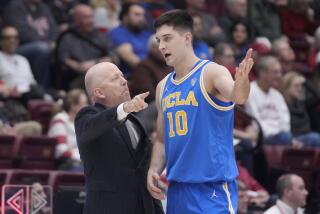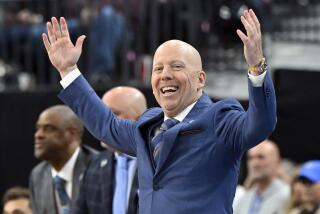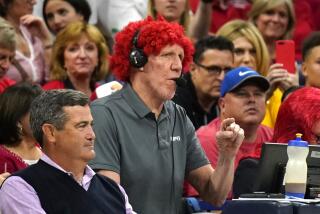John Wooden dies at 99; coach won 10 national basketball titles at UCLA
John Wooden, the UCLA basketball coach who became an icon of American sports while guiding the Bruins to an unprecedented 10 national championships in the 1960s and ‘70s and remained in the spotlight during retirement with his “Pyramid of Success” motivational program, has died. He was 99.
Though his fame extended beyond the sports world, it was Wooden’s achievements during 27 seasons at UCLA that put him in the company of such legendary coaches as the Green Bay Packers’ Vince Lombardi and Notre Dame’s Knute Rockne.
Wooden’s string of championships began with back-to-back victories in 1964 and ’65. Starting in 1967, his team ran off seven consecutive NCAA titles -- going 38 tournament games without a loss -- a feat unmatched before or since in men’s college basketball.
The Bruins won with such dominant big players as Kareem Abdul-Jabbar and Bill Walton. They also won with teams -- such as Wooden’s last squad in 1974-75 -- that had no marquee stars.
That team defeated Kentucky, 92-85, in the national championship game to give Wooden his 10th and final title. Mike Krzyzewski of Duke won his fourth national title this spring, matching the total won by the late Adolph Rupp of Kentucky.
In 40 years of coaching high school and college, Wooden had only one losing season -- his first. He finished with 885 wins and 203 losses, and his UCLA teams still hold an NCAA record for winning 88 consecutive games from 1971 through 1974.
The man known as the “Wizard of Westwood” -- a nickname he despised -- built his dynasty on simple precepts. He insisted that his squad be meticulously prepared and in top physical condition. He demanded crisp fundamentals and teamwork. He wanted his players to be smart, both on the court and in their lives away from the game.
To that end, the stern, dignified Midwesterner developed his “Pyramid of Success” -- a teaching system based on such traditional values as cooperation and personal responsibility. Years later advocates of the program used it as a motivational tool in the corporate world.
John Robert Wooden was born Oct. 14, 1910, in Hall, Ind., the third of six children. His father was a farmer who guided the family through tough economic times by stressing hard work, honesty and the value of education.
In 1932, Wooden, a three-time All-American, led Purdue to its only national basketball championship and married his high school sweetheart, Nell Riley. After graduation, he went to work as a coach and English teacher at Dayton, Ky., High School, where his first team went 6-11, and then at South Bend, Ind., Central High, where he nurtured a string of winning teams.
During World War II, Wooden enlisted in the Navy to serve as a physical trainer for combat pilots. Upon his discharge in 1946, he took a job as athletic director and coach of the basketball and baseball teams at what is now Indiana State University.
After two winning seasons there, it was on to UCLA in 1948. Wooden had highs and lows at first, his teams advancing to the NCAA tournament a few times but then falling to 14-12 in 1960.
The UCLA team of 1963-64 had no one taller than 6 feet 5 in the starting lineup but compensated for lack of size with veteran leadership and great quickness.
The so-called “Bruin Blitz” -- a zone press -- smothered opponents and allowed guards Walt Hazzard and Gail Goodrich to score in bunches. The Bruins stormed into the NCAA tournament undefeated and in the championship game pulled away for a 98-83 victory over Duke.
The winning continued into the next season, with the Bruins losing only twice. In the NCAA title game UCLA scored a 91-80 victory over Michigan.
Those first two championships had been won with strategy and fundamentals. After a mediocre season in 1965-66, Wooden and his Bruins would resume their streak with something else: star power.
The winter of 1966 brought Lewis Alcindor -- who later changed his name to Kareem Abdul-Jabbar -- to the starting lineup. Alcindor actually had enrolled the previous year, recruited from Power Memorial High School in New York City. However, he had to wait a season because at that time NCAA rules did not allow freshmen to play on the varsity team.
Alcindor, at 7 feet plus, dominated the game over the next three seasons, with the team playing in brand-new Pauley Pavilion. Not even a controversial rule change -- college basketball outlawed the dunk in a move thought to be aimed directly at Alcindor -- could faze him. In all, he led the Bruins to an 88-2 record and three straight titles.
Even with historic success, those years were not idyllic. Wooden, the ultimate conformist, was coaching in a time of great social upheaval.
Though UCLA players would always be conservative in appearance -- continually warned about the length of their sideburns -- they sometimes bristled at the coach’s mandates. Alcindor spoke openly of his unhappiness at Westwood and at one point nearly transferred. On the court, there was constant pressure to be perfect.
After Alcindor moved on to the NBA, the Bruins pushed their championship streak to five in a row with titles in 1969-70 and 1970-71.
From the moment that center Bill Walton stepped on the court at the start of the 1971-72 season, the Bruins seemed untouchable. With the smooth-shooting Keith Wilkes at forward, the “Walton Gang” stormed through consecutive 30-0 seasons, winning their sixth and seventh straight titles.
It was during this era that the Bruins won 88 consecutive games, a streak that ended with a loss at Notre Dame on Jan. 19, 1974. UCLA’s championship run finally ended that season with a double-overtime loss to North Carolina State in an NCAA semifinal game.
Wooden reportedly considered retiring that winter but decided to stay for one more season.
On his final night as a coach -- March 31, 1975 -- in the NCAA final the Bruins outran and out-hustled a stronger Kentucky squad, winning 92-85.
“I’ve always said my first year in coaching was my most satisfying,” Wooden reflected during the tournament. “My last year has been equally satisfying. This is as fine a group of youngsters as I’ve ever had.”
In 1977, the Los Angeles Athletic Club established the Wooden Award, recognizing the best college player of the year -- a basketball version of football’s Heisman Trophy.
With each year that passed since his retirement, it seemed less likely that any coach would match his record of success. The NCAA tournament expanded significantly, meaning that teams had to win more games to reach the championship. Wooden’s legacy seemed complete.
But the early 1980s brought troubling allegations about past associations with prominent UCLA booster Sam Gilbert.
After several former players told The Times that Gilbert had supplied athletes with improper benefits ranging from buying players’ game tickets at inflated prices to helping them purchase cars and arranging for loans at steep discounts, the NCAA put UCLA on probation.
None of the violations were tied to Wooden, but the retired coach acknowledged harboring suspicions about Gilbert during the 1960s and ‘70s, and former players spoke of Wooden’s see-no-evil relationship with the booster.
In 1985, Wooden suffered the devastating loss of Nell, his wife of 53 years.
Yet until this past season he remained a presence at Pauley Pavilion, where seven coaches have come and gone in the 35 years since his retirement. Only once have the Bruins won a national championship, under Jim Harrick in 1995.
One of Wooden’s last major appearances was in December 2008, when he and Dodger announcer Vin Scully sat for a 90-minute, televised question-and-answer session with Times sports columnist T.J. Simers at the sold-out Nokia Theatre in downtown Los Angeles.
Wooden is survived by his son, Jim; daughter, Nan; seven grandchildren; and 13 great-grandchildren.One of his great-grandchildren, Tyler Trapani, is a non-scholarship player on the UCLA basketball team.
Services will be private, but a public memorial is being planned at UCLA.
More to Read
Sign up for Essential California
The most important California stories and recommendations in your inbox every morning.
You may occasionally receive promotional content from the Los Angeles Times.












